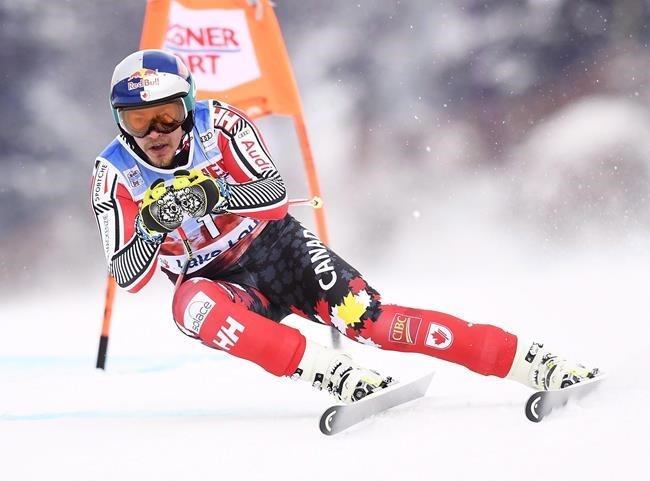TORONTO — Erik Guay will miss his family for just one more winter.
The veteran Canadian skier said Thursday he plans to retire after the 2018-19 World Cup season in March. And a big reason for the decision is that it's becoming more difficult to be away from his wife, Karen, and their four daughters who range in age from one to nine years old.
"I think it's definitely my last year," said Guay, who was in Toronto with the national ski team. "Nothing is 100 per cent, nothing is guaranteed but I just feel like at some point I have to be a full-time dad and I miss it.
"That's actually one of the most challenging things right now, picking up and heading over to Europe for weeks on end. All I want to do is be at home."
The 37-year-old Montreal native is a three-time Olympian and Canada's most accomplished alpine skier. Guay has 25 World Cup podium finishes and three world championship medals (two gold, silver).
But Guay was forced to skip the '18 Winter Games in Pyeongchang, South Korea with a back injury and seriously pondered retirement in the off-season.
"After all the injuries I've had and to sit out the Olympics last year and having four young kids at home, there were moments where I just thought it would be so easy to say, 'I'm done,' and move on to something else," Guay said. "But there's that competitive nature that's still in me that I'd miss and I think that's the reason why I'm back."
And also because Guay is feeling healthy and strong physically.
"If I was struggling with my health . . . that would be kind of a clear sign it's time to hang them up," he said. "I'm coming back from injury so I've got to give myself a little time but I'm not here to finish 30th either.
"If I see that becoming a trend, I'm willing to walk away any time. My attitude is I'm looking for podiums as I always have been. Those are the objectives."
But Guay, who made his World Cup debut in December 2000 at age 19, said preparing for a ski season is becoming much more difficult.
"In the morning you have to get up earlier to warm up, it takes you a little bit longer to find your groove once you're on the ski hill," he said. "As well finding speed, being willing to risk that limit gets tougher with age."
Guay admits he's thought about life after skiing.
"I can't help myself," Guay said. "I know I should be and have to be focused on the task at hand, which is skiing fast.
"I have a few offers and a few ideas, nothing I'm ready to talk about quite yet . . . but I am, of course, thinking about the future."
While he feels good physically, Guay said he's not quite in peak racing form. Yet experience has taught Guay patience and trusting the process.
"Nothing is free, obviously, you can't just sit back and know it's going to come," he said. "But at the same time you know the season is still a month and a half away.
"It's a long season as well so just pace yourself and slowly get into things and it will come eventually."
Guay isn't sure about the mental tug-of-war he'll face preparing himself physically to race while psychologically knowing retirement is around the corner.
"This is kind of uncharted territory," he said. "I don't know what to expect.
"I don't know whether my mind is already going to be in retirement (mode) when I actually need to be focusing and doing what's necessary."
Guay said missing last year's Olympics was very frustrating. But it allowed him to spend precious time with his daughters skiing and watching the Games on television.
"That was special being able to spend time with them, going skiing, coming back and watching the Olympics," Guay said. We had everything kind of scheduled out regarding what we wanted to watch, it was a lot of fun.
"The Olympics is going to be the one medal that's always eluded me. It's tough in a certain aspect but at same time I know the realities of my sport and I know Olympic medals are very hard to get. Anything can go wrong or right on any given day."
Fear is an emotion skiers must deal with and overcome on a daily basis. Downhill competitors can reach speeds approaching 130 kilometres an hour.
"I don't know that I've been scared going down a hill," Guay said. "There are moments, like once you know you're going to crash, that there's fear that sparks up and there's moments at the start where you're like, 'Wow I'm really nervous and I don't feel quite ready.'
"Champions can harness that and still come away with a good result while non-champions kind of buckle under it and take their time going down and finish 50th."
Or compound matters by becoming apprehensive and over-thinking.
"The moment you're hesitant and apprehensive you have a better chance of that being dangerous," Guay said. "There's a time when you need to think and that's during training programs where you work on technique and go into the detail of it.
"But come race day, you don't want to be thinking . . . you want to trust your knowledge and body and go for it."
Dan Ralph, The Canadian Press

